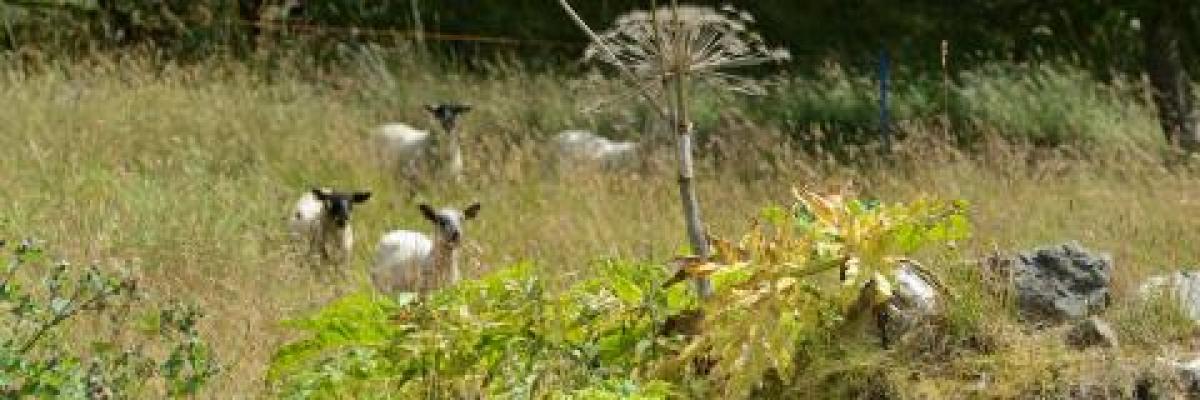NEWS; Sheep join battle against invasive plant invader

A new woolly weapon is being deployed in the battle against giant hogweed on the River Deveron by the Scottish Invasive Species Initiative.
A flock of a dozen sheep have arrived on location near Huntly (Aberdeenshire) to start the important work of munching through the invasive giant hogweed plants growing there.
Reaching heights of 2-3m, giant hogweed not only causes harm to our native wildlife by dominating sites and shading out native vegetation, but its sap is harmful to people and can cause serious and painful burns on contact with the skin.
This makes mature and dense stands of the plants more difficult to remove - normally chemical spraying by trained and protected staff is the most effective treatment method. However, following an encouraging trial by the Deveron, Bogie & Isla Fishery Trust in 2013 grazing by sheep is being further investigated as a viable alternative.
The sheep suffer no ill-effects from the toxic sap and develop a taste for the plant, happily grazing it alongside other vegetation. Richie Miller, Director of the Deveron, Bogie & Isla Rivers Trust said: “The previous trial showed a significant reduction in seedlings, with no evidence of plants reaching maturity during the 3-year grazing period. This was a really inspiring and important outcome and this new trial will allow us to build on the previous findings and undertake more essential research to demonstrate the effectiveness of grazing in hogweed control.”
The new trial is supported by The University of Aberdeen who are monitoring the site to produce a full evaluation of the grazing project in terms of both the effectiveness and costs. This will help to determine whether this is a viable and cost-effective option for giant hogweed control in Scotland and, potentially, elsewhere.
The grazing trial is part of the Scottish Invasive Species Initiative (SISI), an ambitious 4-year project led by Scottish Natural Heritage and funded by the Heritage Lottery Fund, which is working across northern Scotland to tackle the problem of Invasive Non-Native Species. Project Manager Callum Sinclair explained: “The project is tackling several key invasive non-native plant species commonly found along river banks namely giant hogweed, Japanese knotweed and Himalayan balsam. One of our aims is to develop sustainable methods of managing invasive species, if the sheep prove to be successful at eradicating giant hogweed this could be a huge step forward for the management of the species across Scotland.
“SISI is also about providing support and building the skills of individuals and communities in the fight against these invasive species. To do that we will be providing a range of volunteering opportunities across the project area – we are really pleased to have recruited these dozen sheep volunteers to the scheme and look forward to working with them in the future.”
Al Reeve, SISI Project Officer on the River Deveron added: “I never quite expected to be enlisting sheep to the project when I joined up but I’m looking forward to seeing them deal with this hogweed challenge. We’re optimistic they can do a great job for us and the farmer and landowner who are kindly supporting this trial.”
